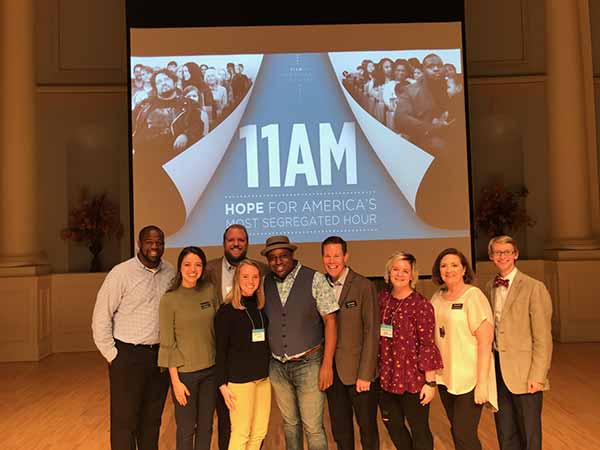
David Bailey is the founder of Arrabon, a ministry that equips churches and nonprofits with the tools and resources to shepherd their community from aspirational values regarding diversity along racial, ethnic, and class divisions towards an embodied practice. He is the author of Arrabon: Learning Reconciliation through Community and Worship Music, and the producer of the Urban Doxology project. David and his wife Joy live in Richmond, VA.
Bailey was the guest speaker for Samford’s campus worship service at 10 a.m. which was followed with lunch hosted by CWA. Samford students, employees, and local church leaders attended the lunch, where conversations were facilitated regarding racial reconciliation in the Church.
Wen Reagan, associate director for the CWA and Samford faculty member, hosted the lunch conversation with David Bailey. Reagan said, “I love how David’s work focuses on reconciliation as a practice and not as an outcome or goal. As David explained, the practice of reconciliation requires a shared space of mercy where we can confess our fears, hangups, and misconceptions without fear of judgment, a space where there is grace for messiness, and a space that’s not only conducive to talking together, but doing together, building culture together. For David and Arrabon, that has looked like writing new worship songs of reconciliation together. What might it look like for Birmingham?”
Bailey believes that the Church should and can lead by example in diversity and reconciliation, and stressed the call for the Church. “Not every church is called to be a diverse community, but every church is called to be a reconciling community in the name of Jesus Christ,” Bailey said.
Bailey’s visit included visits to multiple classes and ended with a screening of 11AM: Hope for America’s Most Segregated Hour, a film by Peripheral Vision PDX. The hour-long documentary highlights the work of Arrabon, whose bold vision is to raise up and train a new generation of artistic leaders who will write a new narrative in the former Capital of the Confederacy. With such a challenging diversity of backgrounds, beliefs, and experiences, this group of young musicians, nationally known as Urban Doxology, strives to bring hope for change to America’s most segregated hour, 11 a.m. on Sunday mornings.
Madison Hablas, a junior at Samford University, attended the Worship Exchange event and shared, “The whole day was very discussion-based, which was needed. It was really neat for us [college students] to have a place to ask real and hard questions about race without feeling shame. The conversations were fruitful and honest and I’m thankful for the opportunity to spend time with a diverse group of people and learn together.”
For more information on the Center for Worship and the Arts, visit samford.edu/go/cwa.
Samford University’s Worship Exchange Program is an ongoing effort to provide resources for our faculty, staff, and students to engage and explore topics related to adolescent worship practices, intergenerational worship, and the creative use of the arts in worship.
